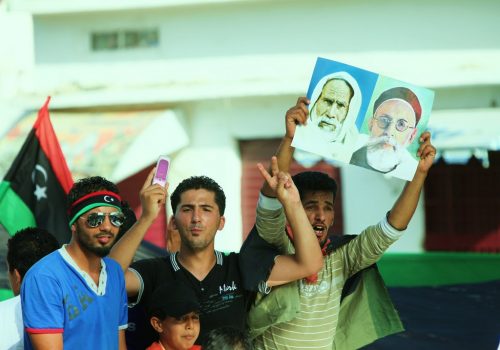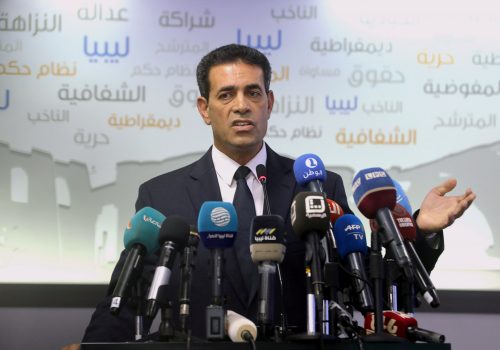Will Libya have two prime ministers again?
Libya is facing political turmoil again. On February 10, the country’s parliament, the House of Representatives, voted to sack the current Prime Minister Abdulhamed Dbeiba and appoint Fathi Bashaga, the interior minister in the previous government and main architect of the resistance against General Khalifa Haftar’s attack on Tripoli in 2019.
Sources on the ground told me that the vote wasn’t transparent and was made by a very brief show of hands after several members of parliament had left the session. Moreover, there was no formal list of deputies present. Bashaga, who received the support of Aghela Saleh, the president of the House of Representatives, now has ten days to appoint a cabinet and obtain its approval from the parliament.
The reason for the vote against Dbeiba was that he had exhausted his time in office, a position he held since February 5, 2021. The prime minister was supposed to last only until the scheduled elections but they were never held on December 24, 2021. Dbeiba—whose government isn’t set to step down until June 2022, as per the rules stated by the United Nations-led Libyan Political Dialogue Forum (LPDF)—is now arguing that his mandate should last until a newly-elected government is formed and that he will resign only to a government appointed by legitimately-elected institutions—if and when elections happen.
In theory, Libya may have two governments again as it did from 2015 to 2020, when a government formed by the House of Representatives sat in the eastern city of Beida, led by Prime Minister Abdullah al-Thani, while the internationally-recognized government resulting from the LPDF and led by Fayez al-Serraj sat in the northwest capital, Tripoli. This fact has pushed many to decry the risk of a renewal of armed confrontations between local militias and the Libyan National Army (LNA) led by General Haftar, or among their different political affiliations and local militias. Nevertheless, even a superficial analysis shows that this case, while possible, is highly improbable.
First, the apparent fracture between eastern and western Libya is now much more complicated. The fact that the warlord of the east, Haftar, and his increasingly powerful coterie of sons and family members have backed President Saleh’s maneuvers to have Bashaga appointed as prime minister unveils a deeper strategy.
By allying with a powerbroker in western Libya, such as strongman Bashaga, who is from Misurata, and potentially co-opting another important personality from his hometown, such as Ahmed Maitig, the vice president of the previous government, Haftar can break the western front against him and turn relevant forces on his side. This strategy aims to create the conditions for Haftar to govern by proxy in Tripoli, a position which he failed to obtain militarily with his April 2019 offensive. Nevertheless, to succeed, this strategy presupposes the adhesion of militias in Tripoli and Misurata—an outcome that is still far from being certain.
In reality, it’s far more likely that the opposite may happen—that the local militias react negatively towards the new government. However, even if the militias were to turn against the Bashaga-led government, Haftar’s strategy may still come to fruition. An alternate government can be a real thorn in the side of the Dbeiba government and could block him from restructuring the Libyan state and preparing the road to elections as per its mandate.
International actors that support the Dbeiba cabinet, such as the UN Support Mission to Libya, would also feel the pressure of a continued low-level confrontation and a stalled political and economic situation. From this, the conclusion would be that General Haftar and President Saleh would soon be the winners one way or another. The duo would obtain a commanding position in the new Libyan Army, which would be formed around the LNA’s core, and would give Saleh the powerful role of president of parliament for a much longer time than foreseen. These two outcomes are the objectives of Haftar and Saleh’s actions since their entrance into the political field.
Of course, Dbeiba may react to the situation by giving up and allowing Bashaga to enter the capital Tripoli as the only prime minister of Libya, but this is also an improbable outcome. Either way, Dbeiba will have to negotiate. An armed confrontation neither serves his nor his supporters’ interests.
The ball is now in the court of international actors that have played a role in the Libyan crisis. They can stick with Dbeiba and support him in negotiating with the new Bashaga government. However, it’s hard to believe that the United States and Italy will oppose the appointment of a prime minister by Libya’s parliament after they have expressed for years that the country’s problems have to be solved by Libyans and must foster a Libyan-owned solution.
There is little doubt that much of the impetus behind Saleh’s maneuvers to have parliament declare the end of Dbeiba’s government and nominate Misurata strongman Bashaga in his place is mostly of Libyan origin. It’s a plot devised by the upper echelons of the country’s post-Muammar Qaddafi political class. Nevertheless, given the evident necessity for each local actor to have the support of a powerful external ally that will further enhance their chances of success, it would be ingenuous to think that there has been no interference or action—or even pressure—from international actors.
The novelty of this latest episode in Libya’s recent history is that it has caused a reshuffle of the positions of these external actors. According to my sources on the ground, France, and surprisingly, Qatar, are the main supporters of the Saleh-Haftar-Bashaga block along with, more reluctantly, Egypt. Even more surprisingly, the United Arab Emirates is allegedly the leading supporter of Dbeiba, siding with the United Nations, US, Italy, and the United Kingdom. The next few days will reveal how this intricate situation will evolve.
With all its nuanced complexity, this political upheaval is also the main reason why there is, at least in the short term, a low probability for an armed confrontation to erupt. However, this doesn’t necessarily bode well for Libya and the Libyan people. Conversely, the probable result of negotiations—or, more accurately, deals—between these factions will mean the continuation of a corrupt, kleptocratic political class, with the consequent further pillaging of state resources and continued impoverishment of the Libyan population.
Karim Mezran is director of the North Africa Initiative and resident senior fellow with the Rafik Hariri Center and Middle East Programs at the Atlantic Council.
Further reading
Thu, Oct 21, 2021
A return to a constitutional monarchy may solve Libya’s problems
MENASource By
When it comes to choosing their next chapter, some Libyans have already identified a promising path forward: restoring the 1951 constitution, which called for a representative, technocratic government with a hereditary monarch.
Tue, Dec 21, 2021
At least three of Libya’s presidential candidates may not be fit for the role. Here’s who they are.
MENASource By Alia Brahimi
An examination of the most controversial presidential candidates out of a crowded field of ninety-eight reveals some of the complications embedded in the electoral process, and how the polls in Libya could unravel rather than realize its democratic promise.
Tue, Nov 23, 2021
Chairman of Libya’s High National Election Commission: Libya doesn’t have the right environment for a referendum
MENASource By
Tahani Elmogrbi, a Libya expert, interviewed High National Election Commission Chairman Dr. Emad Al-Sayah for the Atlantic Council’s North Africa Initiative, prior to the shakeup at the Libyan Post Telecommunications and Information Technology Holding Company.
Image: Abdulhamid Dbeiba, Prime Minister of Libya, at the Berlin Libya Conference Berlin in Berlin, Germany (Reuters)


